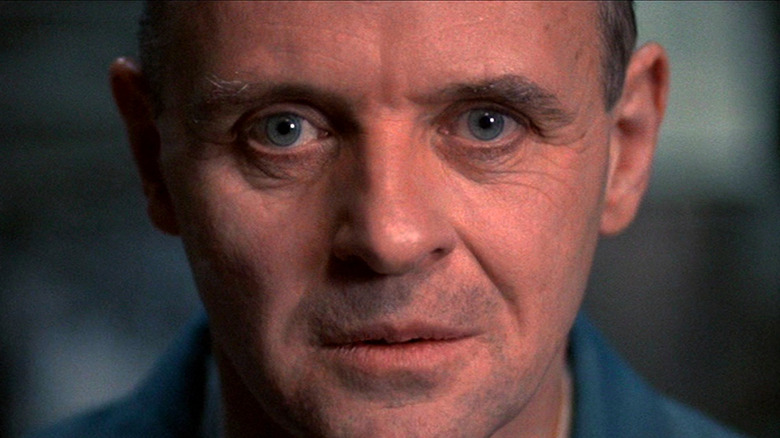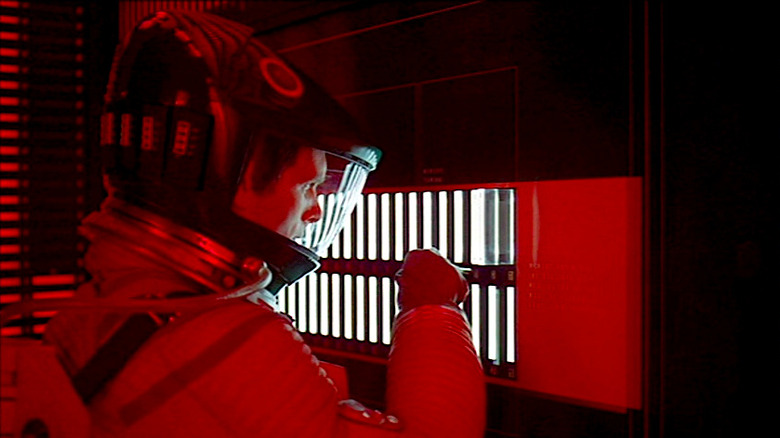The Surprising Way 2001: A Space Odyssey Influenced Silence Of The Lambs
You know the voice. It's calm, collected, barely tinged with emotion or emphasis. When you listen to it speaking, you find yourself both soothed by it and also disturbed, the cadence so calming it almost feels like a threat. If you're a fan of Jonathan Demme's "The Silence of the Lambs," perhaps this description reminds you of the voice Anthony Hopkins chose to use in his assured portrayal of Hannibal Lecter. After all, it's one of Hannibal's most memorable character traits (you know you've mimicked the fava beans and the slurping at least once in your life). But the affectlessness of Dr. Lecter's voice is not something pulled out of thin air — his inspiration for Hannibal's disinterested tone came entirely from another famous movie.
Decades before "The Silence of the Lambs" would thrill and disturb its viewers, another very different film was busy enthralling and baffling audiences: Stanley Kubrick's "2001: A Space Odyssey." It has gone on to become one of the most celebrated films ever made, loaded with iconic scenes and visuals, like its famous bone-to-spaceship jump cut and strange and ominous monolith. But perhaps the most memorable thing from "2001: A Space Odyssey" is HAL, the seemingly sentient computer that eventually, and lethally, turns on the crew of Discovery One. And just what is so memorable about HAL? His voice.
That's right, the voice of the famous serial killer Hannibal Lecter was heavily influenced by the seemingly-sociopathic super computer HAL.
The birth of an artificial voice
Finding the voice for HAL was not an easy task. Kubrick had a very specific idea in mind for what he wanted the computer to sound like. An article for The New York Times dives deep into the history behind this extremely famous voice, explaining how HAL was "the result of a last-minute collaboration between the idiosyncratic director Stanley Kubrick and the veteran Canadian actor Douglas Rain." Because the film was not made during a time of real talking artificial intelligence, Kubrick had to come up with what he thought a futuristic talking computer might actually sound like.
Initially, HAL was supposed to be voiced by Martin Balsam, but Kubrick changed his mind after hearing Balsam in the role. The NYT's article quotes Kubrick explaining that "Marty just sounded a little bit too colloquially American" for the part, which is why Rain was eventually brought in to replace him. He had become entranced by Rain's voice from hearing him speak in a 1960 documentary called "Universe," and described Rain's voice as being "neither patronizing, nor is it intimidating, nor is it pompous, overly dramatic or actorish. Despite this, it is interesting." Rain was brought in to the studio to record the part, and his Canadian English accent was just what Kubrick had been looking for.
The NYT's article goes on to mention that HAL's distinct voice served as the inspiration for Anthony Hopkins's Hannibal Lecter, and when you listen to the two voices back to back, it is easy to see the resemblance. Both voices express a chilling blandness that cuts to the heart of both HAL and Lecter's personalities. They are both self-interested killers with very little regard for human life, and they are willing to do anything to protect themselves. It was a brilliant move on Hopkins's part to base Lecter's speech patterns on HAL. The voice of Hannibal Lecter draws you in just as much as it repels you. You want to lean closer to make sure you hear every word, but if you get too close, you risk death (RIP sergeants!), and it's fitting that the iciness of Lecter is based on the inhuman speech patterns of a machine. Just like HAL, we sometimes find ourselves wanting to sympathize with Lecter even though he may never be more than a man programmed to kill.

